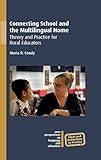Connecting School and the Multilingual Home : Theory and Practice for Rural Educators / Maria R. Coady.
Material type: TextSeries: New Perspectives on Language and EducationPublisher: Bristol ; Blue Ridge Summit : Multilingual Matters, [2019]Copyright date: ©2019Description: 1 online resourceContent type:
TextSeries: New Perspectives on Language and EducationPublisher: Bristol ; Blue Ridge Summit : Multilingual Matters, [2019]Copyright date: ©2019Description: 1 online resourceContent type: - 9781788923262
- 9781788923279
- Bilingualism in children -- Parent participation
- Education -- Parent participation
- Home and school
- Parent-teacher relationships
- LANGUAGE ARTS & DISCIPLINES / Linguistics / General
- Community
- English language learner
- Multilingual/ Bilingual
- Relationship between school and family
- Rural
- Teacher education
- schools working with families
- 371.19/2 23
- P115.2 .C63 2019eb
- online - DeGruyter
| Item type | Current library | Call number | URL | Status | Notes | Barcode | |
|---|---|---|---|---|---|---|---|
 eBook
eBook
|
Biblioteca "Angelicum" Pont. Univ. S.Tommaso d'Aquino Nuvola online | online - DeGruyter (Browse shelf(Opens below)) | Online access | Not for loan (Accesso limitato) | Accesso per gli utenti autorizzati / Access for authorized users | (dgr)9781788923279 |
Frontmatter -- Contents -- Tables and Figures -- Acknowledgments -- About the Author -- Introduction: Engaging Rural Multilingual Families: Theories and Practices -- 1. Rural Multilingual Family Engagement in the 21st Century Highlights -- 2. Framing the Issues: A ‘Strengths-Based Approach’ to Family Engagement -- 3. Family-Centered Differentiated Engagement Highlights -- 4. Praxis and Practice: Becoming Aware of Multilingual Families in Rural Settings -- 5. Practice and Praxis: Acting to Engage Multilingual Families in Rural Schools -- 6. The Intersectionality of Rurality, Poverty and Immigration for Latino Families in the USA -- 7. The Role of Community Agencies in Family Engagement -- 8. Conclusions for 21st Century Rural, Multilingual Family Engagement -- Index
restricted access online access with authorization star
http://purl.org/coar/access_right/c_16ec
This book examines the educational gaps that multilingual students in rural communities experience. It argues that responsive, successful relationships between schools and multilingual families are a crucial aspect of all educators’ work and that no single strategy will work for all families. Rural multilingual family engagement involves building meaningful partnerships and relational trust, based on significant knowledge of families' cultures and language repertoires. Educators can reframe their work by learning from families and building on the strengths of multilingual families, which are too-often overlooked in school policies and educator practices. This is the first book to focus specifically on rural school settings. However, the conceptual framework of equity and linguistically responsive pedagogy are applicable across settings for educators who wish to support their multilingual students and families.
Mode of access: Internet via World Wide Web.
In English.
Description based on online resource; title from PDF title page (publisher's Web site, viewed 25. Jun 2024)


